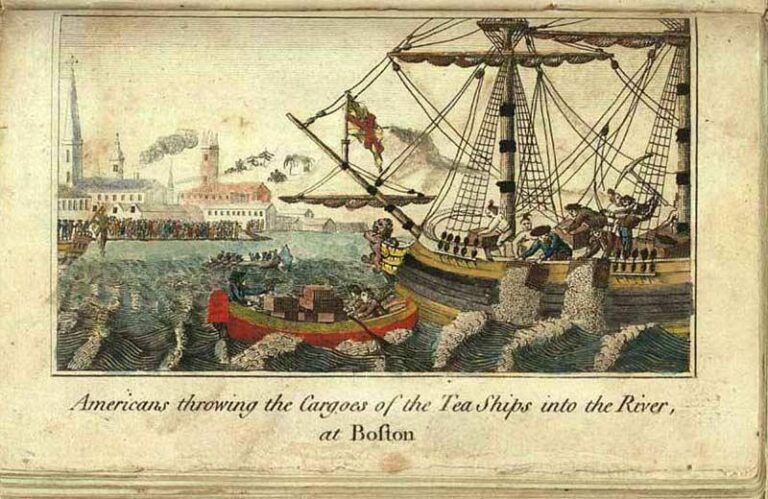Boston, MA – On a chilly December night in 1773, a group of American colonists dramatically reshaped the course of history by dumping an entire shipment of British tea into Boston Harbor. Known as the Boston Tea Party, this bold act of defiance against British taxation policies ignited a chain reaction that would ultimately lead to the American Revolution. More than just a protest over tea, it became a symbol of colonial resistance and unity, marking a crucial turning point in the struggle for independence. This article delves into the events of that fateful night, the wider political tensions of the era, and how the Boston Tea Party set the stage for revolution.
Table of Contents
- Boston Tea Party Ignites Colonial Resistance Nationwide
- Economic Impact and Escalation of British Retaliation
- Voices of the Patriots The Role of Key Revolutionaries
- Strategies for Commemorating and Educating Future Generations
- Future Outlook
Boston Tea Party Ignites Colonial Resistance Nationwide
The dramatic protest in Boston Harbor, where American colonists defiantly dumped 342 chests of British tea into the icy waters, served as a catalyst for widespread dissent across the thirteen colonies. This bold act of rebellion transcended local outrage, galvanizing a unified response that transcended geographic boundaries. The incident not only highlighted the stark opposition to the Tea Act but also ignited an unprecedented wave of political activism and solidarity, marking a pivotal moment in colonial resistance against British imperial control.
In the days and weeks following the event, colonial leaders and ordinary citizens alike mobilized, inspired by the audacity of the Boston protestors. Key developments during this nationwide surge included:
- Formation of Committees of Correspondence to facilitate intercolonial communication and coordination.
- Emergence of boycotts against British goods, emphasizing economic resistance as a powerful tool.
- Organizing of public assemblies and petitions demanding repeal of oppressive legislation.
These coordinated efforts underscored a newfound collective identity and determination, setting the stage for the revolutionary movements that would ultimately reshape the political landscape of America.
Economic Impact and Escalation of British Retaliation
The British government’s response to the Boston Tea Party was swift and severe, imposing the Coercive Acts-also known as the Intolerable Acts-as a means to reassert control over the increasingly defiant colonies. These punitive measures effectively closed Boston Harbor, crippled the local economy, and revoked Massachusetts’ charter, igniting widespread outrage throughout the colonies. The economic repercussions rippled far beyond Boston, disrupting trade networks and escalating tensions across colonial markets dependent on British imports and exports.
Key economic consequences and retaliatory measures included:
- Severe restrictions on colonial shipping and commerce, threatening livelihoods and destabilizing local economies.
- A unifying effect among disparate colonial economies, encouraging coordinated resistance and collective boycotts of British goods.
- Heightened military presence in key ports, increasing both the financial burden on colonial governments and the risk of violent confrontation.
- Escalation from economic protests to open political defiance, laying groundwork for the Continental Congress and eventual revolution.
Voices of the Patriots The Role of Key Revolutionaries
At the heart of the Boston Tea Party’s seismic impact stood figures whose unwavering resolve propelled the colonies toward revolution. Samuel Adams, often hailed as the master organizer, galvanized public opinion by articulating the frustrations of the common citizen. Meanwhile, John Hancock, with his bold signature and political influence, symbolized defiance against British tyranny. These patriots employed sharp rhetoric and strategic acts of civil disobedience, transforming scattered dissent into a cohesive movement demanding liberty and justice.
In addition to these prominent leaders, numerous unsung heroes contributed tirelessly to the cause. Committees of Correspondence, composed of dedicated local patriots, ensured rapid communication and coordination across the colonies. Their efforts were epitomized by a network of couriers and pamphleteers who spread revolutionary ideas far beyond Boston’s waterfront. Key actors in this unfolding drama leveraged public meetings, printed manifestos, and secret planning sessions to keep resistance alive, setting the stage for a united front that would challenge imperial authority.
- Samuel Adams: Architect of protest and community organizer.
- John Hancock: Symbol of bold patriotism and leadership.
- Committees of Correspondence: Facilitators of colonial unity and communication.
- Anonymous Patriots: The backbone of grassroots resistance.
Strategies for Commemorating and Educating Future Generations
To ensure the spirit of the Boston Tea Party resonates with future generations, communities and educators are adopting dynamic methods beyond traditional textbooks. Interactive museums and augmented reality experiences bring history to life, allowing visitors to witness the events unfold from multiple perspectives. Schools increasingly integrate project-based learning, where students reenact debates and simulate colonial decision-making, fostering a deep understanding of the revolutionary fervor that ignited America’s pursuit of independence.
Key initiatives gaining momentum include:
- Establishing annual commemorative events involving youth-led panels and interactive workshops.
- Developing digital archives and oral history projects that capture diverse colonial and indigenous perspectives.
- Incorporating arts and literature that contextualize the socio-political climate of the 18th century.
These efforts underscore a commitment not only to honor the bold acts of defiance but also to empower future generations with the knowledge and critical thinking skills necessary to appreciate the complex roots of American democracy.
Future Outlook
As the echoes of the Boston Tea Party continue to resonate through history, it remains clear that this pivotal act of defiance was more than a simple protest against taxation-it was the spark that ignited a revolutionary movement. The event not only galvanized colonial unity but also set the stage for a broader struggle for independence and self-determination. Understanding the Boston Tea Party’s significance offers vital insight into the origins of the American Revolution and the enduring quest for liberty that shaped a nation.

